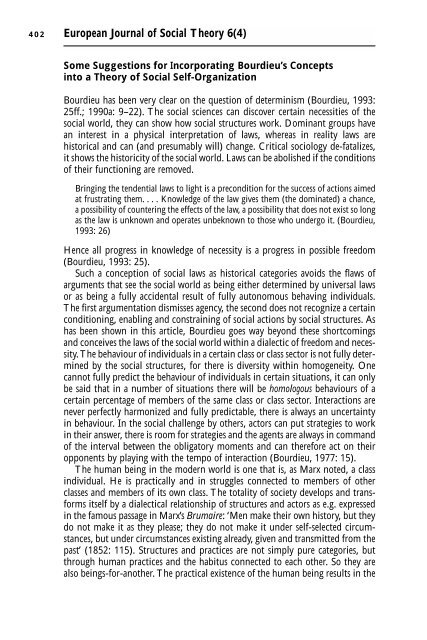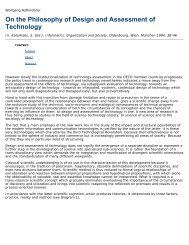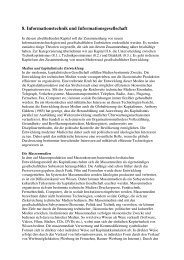Some Implications of Pierre Bourdieu's Works for a Theory of Social ...
Some Implications of Pierre Bourdieu's Works for a Theory of Social ...
Some Implications of Pierre Bourdieu's Works for a Theory of Social ...
You also want an ePaper? Increase the reach of your titles
YUMPU automatically turns print PDFs into web optimized ePapers that Google loves.
402European Journal <strong>of</strong> <strong>Social</strong> <strong>Theory</strong> 6(4)<strong>Some</strong> Suggestions <strong>for</strong> Incorporating Bourdieu’s Conceptsinto a <strong>Theory</strong> <strong>of</strong> <strong>Social</strong> Self-OrganizationBourdieu has been very clear on the question <strong>of</strong> determinism (Bourdieu, 1993:25ff.; 1990a: 9–22). The social sciences can discover certain necessities <strong>of</strong> thesocial world, they can show how social structures work. Dominant groups havean interest in a physical interpretation <strong>of</strong> laws, whereas in reality laws arehistorical and can (and presumably will) change. Critical sociology de-fatalizes,it shows the historicity <strong>of</strong> the social world. Laws can be abolished if the conditions<strong>of</strong> their functioning are removed.Bringing the tendential laws to light is a precondition <strong>for</strong> the success <strong>of</strong> actions aimedat frustrating them. . . . Knowledge <strong>of</strong> the law gives them (the dominated) a chance,a possibility <strong>of</strong> countering the effects <strong>of</strong> the law, a possibility that does not exist so longas the law is unknown and operates unbeknown to those who undergo it. (Bourdieu,1993: 26)Hence all progress in knowledge <strong>of</strong> necessity is a progress in possible freedom(Bourdieu, 1993: 25).Such a conception <strong>of</strong> social laws as historical categories avoids the flaws <strong>of</strong>arguments that see the social world as being either determined by universal lawsor as being a fully accidental result <strong>of</strong> fully autonomous behaving individuals.The first argumentation dismisses agency, the second does not recognize a certainconditioning, enabling and constraining <strong>of</strong> social actions by social structures. Ashas been shown in this article, Bourdieu goes way beyond these shortcomingsand conceives the laws <strong>of</strong> the social world within a dialectic <strong>of</strong> freedom and necessity.The behaviour <strong>of</strong> individuals in a certain class or class sector is not fully determinedby the social structures, <strong>for</strong> there is diversity within homogeneity. Onecannot fully predict the behaviour <strong>of</strong> individuals in certain situations, it can onlybe said that in a number <strong>of</strong> situations there will be homologous behaviours <strong>of</strong> acertain percentage <strong>of</strong> members <strong>of</strong> the same class or class sector. Interactions arenever perfectly harmonized and fully predictable, there is always an uncertaintyin behaviour. In the social challenge by others, actors can put strategies to workin their answer, there is room <strong>for</strong> strategies and the agents are always in command<strong>of</strong> the interval between the obligatory moments and can there<strong>for</strong>e act on theiropponents by playing with the tempo <strong>of</strong> interaction (Bourdieu, 1977: 15).The human being in the modern world is one that is, as Marx noted, a classindividual. He is practically and in struggles connected to members <strong>of</strong> otherclasses and members <strong>of</strong> its own class. The totality <strong>of</strong> society develops and trans<strong>for</strong>msitself by a dialectical relationship <strong>of</strong> structures and actors as e.g. expressedin the famous passage in Marx’s Brumaire: ‘Men make their own history, but theydo not make it as they please; they do not make it under self-selected circumstances,but under circumstances existing already, given and transmitted from thepast’ (1852: 115). Structures and practices are not simply pure categories, butthrough human practices and the habitus connected to each other. So they arealso beings-<strong>for</strong>-another. The practical existence <strong>of</strong> the human being results in the





